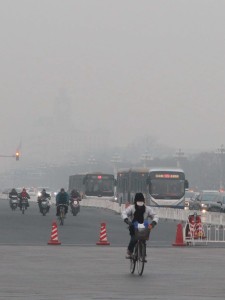 Besides laying out impressive economic reforms, last year’s Third Plenum Decision also underlined the importance of China’s environment and how the country’s ongoing economic development must not be to its detriment. While China’s economy was still growing in the double-digits, the damage this caused to the country’s ecosystem was all too often gravely neglected.
Besides laying out impressive economic reforms, last year’s Third Plenum Decision also underlined the importance of China’s environment and how the country’s ongoing economic development must not be to its detriment. While China’s economy was still growing in the double-digits, the damage this caused to the country’s ecosystem was all too often gravely neglected.
The Chinese Government has now, however, acknowledged that the soundness of China’s ecosystem is an intrinsic prerequisite for the ongoing harmonious development of the country and the health of its population.
The European Chamber greatly appreciates the increasing emphasis placed on environmental protection. Facing China’s environmental challenges requires increased cooperation among all stakeholders and healthy market competition in order to bring about the best and most innovative solutions China needs.
In this issue of EURObiz we revisit environmental issues in China, having previously examined the topic in the January/February 2012 edition. Included herein are articles on the pervasive problem of China’s air quality, a subject that continues to draw the attention of domestic and foreign media, and remains a hot topic on social networks.
 Air pollution can be controlled as events in Beijing such as the 2008 Olympics and the recent APEC 2014 summit have demonstrated – though at what cost? Often municipal governments issue orders to shut down industrial plants in advance of such meetings, only for pollution to increase markedly as these plants revamp their operations after their outage. During such spikes, air pollution often reaches levels that are off the scale – a worrisome occurrence.
Air pollution can be controlled as events in Beijing such as the 2008 Olympics and the recent APEC 2014 summit have demonstrated – though at what cost? Often municipal governments issue orders to shut down industrial plants in advance of such meetings, only for pollution to increase markedly as these plants revamp their operations after their outage. During such spikes, air pollution often reaches levels that are off the scale – a worrisome occurrence.
It is a very positive development that the National People’s Congress Standing Committee approved revisions of China’s Environmental Protection Law (EPL) earlier this year – the first change to the law in 25 years, since it took effect in 1989. The amendments are due to come into effect on 1st January, 2015. The revised EPL will place greater emphasis on environmental data transparency and public participation in environmental governance, and will increase public access to environmental data. It also promises to hold authorities to greater account and impose stricter fines on environmental polluters.
The European Chamber is looking forward to the revised EPL coming into effect. This is a very positive development that bodes well for the future health of China’s ecosystem.
European industry stands ready to leverage its expertise and technology to help China achieve its environmental goals. In order to see how this is done in practice, we will look at three EU-China environmental projects: the EU-China Environmental Governance Programme, the Supporting the Design and Implementation of Emissions Trading Systems (ETS) in China project and the development of the EU-China TEEB (The Economics of Ecosystems and Bio-diversity) Platform by the EU-China Policy Dialogue Support Facility.
Besides our focus on the environment, this edition of EURObiz also includes a special EU Focus, with a ‘Who’s who?’ in the new European Commission and an article by DG TRADE on the EU-China Bilateral Investment Agreement (BIA). We are also particularly proud to present an exclusive interview with the new Ambassador of the European Union to China, HE Hans Dietmar Schweisgut, who answers questions on China’s reform agenda, China’s role in the World Trade Organisation and the importance of the ongoing BIA negotiations.
While the last issue of EURObiz was extensively devoted to the Fourth Plenum and its reaffirmation of ‘rule of law’, we will revisit the topic in this issue with further in-depth analysis of the Fourth Plenum Decision and what it means for foreign business in China. There are two perspectives provided – a legal overview and a special piece by Jonathan Fenby who looks more closely at the language of the Fourth Plenum Decision. Mr Fenby finds that there is not as much to be positive about as many media and commentators have made out.
On a personal note, I am particularly glad to have recently visited our Chapters in Southwest China and the Pearl River Delta, and am glad to be returning to Guangzhou again at the end of this month for our next Executive Committee meeting. Close contact with all the Chamber’s Chapters and members is particularly important for me, in our efforts to speak with ‘One Voice’ for European industry in China.
European industry is glad to be in China and will continue to make its contribution to China’s economic growth in a clean, environmentally-friendly and sustainable way. The European Chamber is proud of our members’ contributions and we stand ready in our advocacy effort to support our members, and the Chinese Government, in any way we can.
Jörg Wuttke
President of the European Chamber of Commerce in China



Recent Comments